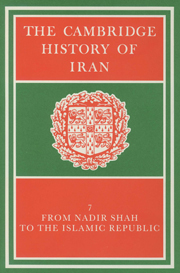Book contents
- Frontmatter
- PART 1 THE POLITICAL FRAMEWORK, 1722–1979
- PART 2 FOREIGN RELATIONS
- PART 3 ECONOMIC AND SOCIAL DEVELOPMENTS
- PART 4 RELIGIOUS AND CULTURAL LIFE, 1721–1979
- 19 RELIGIOUS FORCES IN EIGHTEENTH- AND NINETEENTH-CENTURY IRAN
- 20 RELIGIOUS FORCES IN TWENTIETH-CENTURY IRAN
- 21 POPULAR ENTERTAINMENT, MEDIA AND SOCIAL CHANGE IN TWENTIETH-CENTURY IRAN
- 22 PRINTING, THE PRESS AND LITERATURE IN MODERN IRAN
- 23 PERSIAN PAINTING UNDER THE ZAND AND QĀJĀR DYNASTIES
- 24 THE ARTS OF THE EIGHTEENTH TO TWENTIETH CENTURIES
- Genealogical tables
- Bibliographies
- Index
- References
22 - PRINTING, THE PRESS AND LITERATURE IN MODERN IRAN
from PART 4 - RELIGIOUS AND CULTURAL LIFE, 1721–1979
Published online by Cambridge University Press: 28 March 2008
- Frontmatter
- PART 1 THE POLITICAL FRAMEWORK, 1722–1979
- PART 2 FOREIGN RELATIONS
- PART 3 ECONOMIC AND SOCIAL DEVELOPMENTS
- PART 4 RELIGIOUS AND CULTURAL LIFE, 1721–1979
- 19 RELIGIOUS FORCES IN EIGHTEENTH- AND NINETEENTH-CENTURY IRAN
- 20 RELIGIOUS FORCES IN TWENTIETH-CENTURY IRAN
- 21 POPULAR ENTERTAINMENT, MEDIA AND SOCIAL CHANGE IN TWENTIETH-CENTURY IRAN
- 22 PRINTING, THE PRESS AND LITERATURE IN MODERN IRAN
- 23 PERSIAN PAINTING UNDER THE ZAND AND QĀJĀR DYNASTIES
- 24 THE ARTS OF THE EIGHTEENTH TO TWENTIETH CENTURIES
- Genealogical tables
- Bibliographies
- Index
- References
Summary
In the Preface to the first volume of his Tārīkh-i Jarā’ id va Majallāt-i Īrān (“History of the Press and Periodicals in Iran”) Muhammad Sadr Hāshimī considers the proliferation of newspapers and periodicals in Iran during the Constitutional period to be the principal cause of the dearth of book and monograph publication by scholars and creative writers in the four decades that followed. The lack of such publications, which has certainly not been noticeable since the 1960s so far as non-fiction is concerned, and is amply compensated for in post-revolution Iran, was, he says, unprecedented in times before the advent of the newspaper and periodical. In support of his argument he cites one literary scholar, Vahīd Dastgirdī, who, as any student of Persian literature knows, devoted his life to its study, but produced not a single book. He preferred to confine himself to articles in Armaghā (“The Keepsake”), the literary journal he edited for twenty-two years. Hence, according to Sadr Hāshimī, the need to turn to newspapers, weeklies and more infrequent periodicals, in order to read the speculations and conclusions of researchers, as well as writers' expression of their genius. How ephemeral many of these repositories of Iranian literary output in the first forty years of the 20th century were, was proved when their historian and cataloguer began his work. He discovered that of some no trace could be found. There were instances when, after a lapse of several years, not even former editors and publishers could remember anything about their defunct enterprises.
- Type
- Chapter
- Information
- The Cambridge History of Iran , pp. 815 - 869Publisher: Cambridge University PressPrint publication year: 1991
References
- 6
- Cited by



